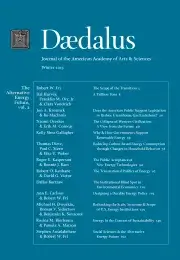Reducing Carbon-Based Energy Consumption through Changes in Household Behavior
Actions by individuals and households to reduce carbon-based energy consumption have the potential to change the picture of U.S. energy consumption and carbon dioxide emissions in the near term. To tap this potential, however, energy policies and programs need to replace outmoded assumptions about what drives human behavior; they must integrate insights from the behavioral and social sciences with those from engineering and economics. This integrated approach has thus far only occasionally been implemented. This essay summarizes knowledge from the social sciences and from highly successful energy programs to show what the potential is and how it can be achieved.
Individuals and households make many decisions that are critical in shaping our energy future. As citizens, people favor some policies and oppose others, support some candidates for elective office and not others, write op-eds, comment on blogs, and otherwise engage in political action. They attempt to influence decisions that help determine which kind of local, state, federal, and international policies are adopted, and such policies in turn shape the energy system of the future. People sometimes engage in more direct politics by organizing to support or oppose proposed technological changes, especially the siting of new facilities. For example, the use of nuclear power in the United States stopped expanding in the 1980s largely as a result of massive public opposition to new nuclear power plants.1 Current proposals for developing wind power facilities often face serious local opposition, as do efforts to develop unconventional shale gas deposits and to implement smart electrical grids and smart home metering.2
Such political actions are critically important to the energy futures of democracies. We focus here, however, on the decisions made when individuals and households act as consumers. These consequential decisions are diverse: selecting a car and deciding when to use it, how to maintain it, and how to drive it; buying and using appliances; and modifying and using the basic space and water heating and cooling systems of dwellings. In some cases, these are “nondecisions,” in that actions are taken without much conscious reflection. Often when reflection does occur, it takes no account of energy use per se or is based on poor understanding of the energy consumption and related (for example, climate) consequences of choices and actions. We limit our discussion to decisions that directly affect energy use. Many other consumer decisions, such as food choices or residential location, also have immense consequences for the energy system, although these are harder to analyze. The energy consequences of a dietary choice, for instance, depend on not only the food chosen but how and where it was produced and processed. Some quantitative estimates of the carbon emissions impacts of consumer food choices are beginning to appear; they suggest that at least in Europe, these emissions approach the magnitude of those from direct energy use.3 In this review, we stick to simpler cases, where the actions taken have direct and easily identifiable impacts on energy use.
. . .
